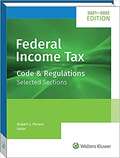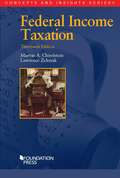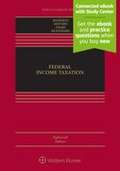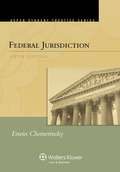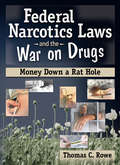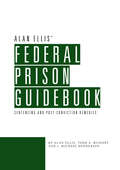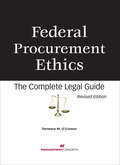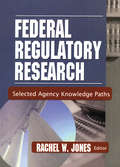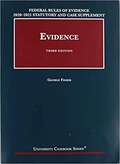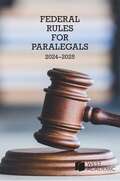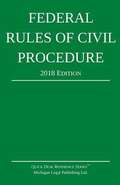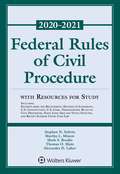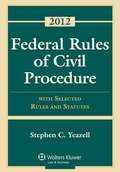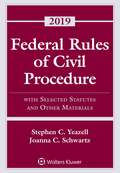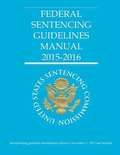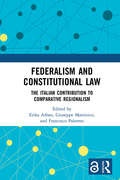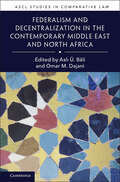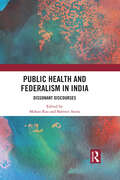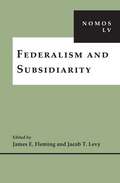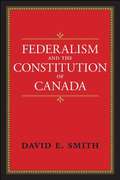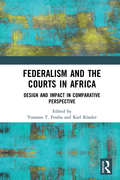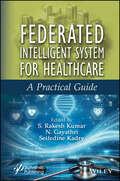- Table View
- List View
Federal Income Tax: Code And Regulations -- Selected Sections (2021-2022)
by Robert J. PeroniThe Federal Income Tax: Code and Regulations\-\-Selected Sections provides a selection of the Internal Revenue Code and Treasury Regulations pertaining to income tax. This popular volume reflects the collective judgment of seven distinguished tax teachers and provides an effective mix of official materials for individual and business undergraduate and graduate tax courses offered in law and business schools. It provides in one volume, the provisions most commonly addressed in income tax courses.
Federal Income Taxation
by Marvin Chirelstein Lawerence ZelenakThis highly-acclaimed text explains the conceptual basis of federal income taxation. It is designed to help students quickly pull together the entire subject for end-of-semester review and provide perspective about where a topic fits within the federal income tax scheme. While focusing on the present income tax, the text provides an explanation of the often-discussed consumption tax and contrasts the two taxes in a note at the end of the volume. The new edition reflects legislative, judicial, and administrative developments since the twelfth edition (including the 2012 tax rate increases and the Supreme Court's Windsor decision), and increases the number of end-of-chapter problems by almost 60%.
Federal Income Taxation (Aspen Casebook Series)
by Edward D. Kleinbard Kirk J. Stark Joseph Bankman Daniel N. ShaviroBuy a new version of this textbook and receive access to the Connected eBook with Study Center on CasebookConnect, including: lifetime access to the online ebook with highlight, annotation, and search capabilities; practice questions from your favorite study aids; an outline tool and other helpful resources. Connected eBooks provide what you need most to be successful in your law school classes. Integrating theory and policy in an accessible format, the sterling author team of Federal Income Taxation, Eighteenth Edition imbues its subject with historical, economic, policy, and international perspective. Problems integrated throughout the text bridge the gap between theory and practice. Each edition of this renowned text builds on and adds to the strengths of its predecessors. New to the Eighteenth Edition: Fully updated to reflect changes made by the Tax Cuts and Jobs Act of 2017. Professors and students will benefit from: Notes, problems, and graphs that make challenging material accessible; The highest integration of economics and policy analysis; Great pedigree and authorship: Original authors Boris Bittker and William A. Klein were eminent authorities (with beautiful writing styles). Bankman, Shaviro, Stark, and Kleinbard are among today's leading tax scholars. A manageable length: Even with the new material, Federal Income Taxation is still one of the shortest books around.
Federal Jurisdiction (Sixth Edition)
by Erwin ChemerinskyA student treatise, by one of the nation's leading authorities in Federal Jurisdiction, intended for use alongside any federal jurisdiction casebook. Features: Comprehensive coverage, with clear descriptions and analyses of the doctrines and policies that determine the jurisdiction of the federal courts Chemerinsky's straightforward approach, in which he clearly states the current law; identifies unresolved issues; and examines underlying, competing policy considerations An even-handed treatment of the material, with multiple viewpoints presented Has been used as the required text in lieu of a traditional casebook, with professors bringing in their own cases New to the Sixth Edition: Updates to include discussions of important developments that occurred after the current edition was published in 2007, among them: Military Commissions Act and Boumediene v. Bush Medellin v. Texas Massachusetts v. EPA, Hein v. Freedom from Religion Foundation, Sprint Communications v. APPC Services, and DaimlerChrysler v. Cuno MedImmune v. Genentech Habeas corpus developments Ashcroft v. Iqbal Stoneridge Investment Partner v. Scientific-Atlanta (implied rights of action)
Federal Narcotics Laws and the War on Drugs: Money Down a Rat Hole
by Thomas C RoweWe&’re losing the "war on drugs"-but the fight isn&’t over yetFederal Narcotics Laws and the War on Drugs examines our current anti-drug programs and policies, explains why they have failed, and presents a plan to fix them. Author Thomas C. Rowe, who has been educating college students on recreational drug use for nearly 30 years, exposes the truth about anti-drug programs he believes were conceived in ignorance of the drugs themselves and motivated by racial/cultural bias. This powerful book advocates a shift in federal spending to move funds away from the failed elements of the "war on drugs" toward policies with a more realistic chance to succeed-the drug courts, education, and effective treatment. Common myths and misconceptions about drugs have produced anti-drug programs that don&’t work, won&’t work, and waste millions of dollars. Federal Narcotics Laws and the War on Drugs looks at how-and why-this has happened and what can be done to correct it. The book is divided into "How did we get into this mess?" which details the history of anti-narcotic legislation, how drug agencies evolved, and the role played by Harry Anslinger, Commissioner of the United States Bureau of Narcotics from 1930 to 1962; "What works and what doesn&’t work," which looks at the failure of interdiction efforts and the negative consequences that have resulted with a particular focus on the problems of prisons balanced against the drug court system; and a third section that serves as an overview of various recreational drugs, considers arguments for and against drug legalization, and offers suggestions for more effective methods than our current system allows.Federal Narcotics Laws and the War on Drugs also examines: the creation of the Federal Bureau of Narcotics current regulations and structures current federal sentencing guidelines current state of the courts and the prison system mandatory sentencing and what judges think interdiction for heroin, cocaine and crack cocaine, and marijuana early education efforts the DARE program drug use trends drug treatment models the debate over legalizationFederal Narcotics Laws and the War on Drugs also includes several appendices of federal budget figures, cocaine and heroin purity and price, and federal bureau of prisons statistics. This unique book is required reading for anyone concerned about the drug problem in the United States and what is-and isn&’t-being done to correct it.
Federal Prison Guidebook
by Michael Henderson Alan Ellis Todd Bussert"Simply put, the Federal Prison Guidebook is indispensable -- for criminal defense lawyers, judges, U.S. Attorneys, probation officers, and individuals (along with their families) facing federal time." -- Elizabeth Kelley, From a review on the NACDL website "Whenever I am asked questions about federal prison realities, I always urge folks to seek more information from Alan Ellis, who literally wrote the book (actually, a number of books) on these matters. My faith in Alan Ellis as the go-to resource was confirmed this past week when I received in the mail the latest, greatest, updated edition of the Federal Prison Guidebook." -- Doug Berman, From a review on his Sentencing Law and Policy blog How to ensure that your client gets into the best possible prison and is released at the earliest opportunity. Although it is Bureau of Prisons policy to place an individual in the least restrictive facility within 500 miles of the inmate's release residence, many inmates end up far from their families in harsher conditions than necessary. It doesn't have to be that way. You can take three steps to ensure that your clients do their time in the best possible facilities. First, learn how the BOP classifies its facilities, and the characteristics of each type of facility. Second, understand how the BOP decides what type of prison is appropriate. Finally, learn how to increase the odds of a favorable placement. For assistance with all three steps, turn to Alan Ellis and Michael Henderson's Federal Prison Guidebook. Learn facility characteristics Most valuable and difficult to obtain is the institution-specific information on educational, vocational, religious, and recreational opportunities. Understand BOP designation process 16% of all federal inmates are housed in camps and community settings. The designation information in Federal Prison Guidebook explains how camp inmates and higher security level designees are selected, and what you can do to influence BOP's scoring. Increase odds of favorable placement Some judges mistakenly think the BOP does not follow their recommendations. While not binding, the BOP actually follows 85% of judicial recommendations. Overcrowding is making supported judicial recommendations more important. Federal Prison Guidebook explains how counsel can affect recommendations and placement.
Federal Procurement Ethics: The Complete Legeal Guide
by Terrence M O'ConnorA Comprehensive and Easy-to-Use Guide to the Federal Procurement Ethics Requirements!Revised to include recent changes in procurement ethics rules, such as the significant additions to the False Claims Act made by Congress in 2009, this book is a complete, all-in-one resource. This plain-English guide focuses on exactly what procurement professionals—both federal officials and contractor employees—need to know to be in compliance with the law and to conduct better business practices.Federal Procurement Ethics: The Complete Legal Guide, Revised Edition, provides comprehensive, easy-to-understand descriptions of all the ethics rules that procurement professionals in both government and the private sector need to follow. Summaries of recent and relevant court cases that illustrate the need for full compliance with procurement regulations are also included.
Federal Regulatory Research: Selected Agency Knowledge Paths
by Rachel JonesProvide your patrons with shortcuts to the legal research resources they need! Federal Regulatory Research: Selected Agency Knowledge Paths presents sample pathfinders to help law librarians access and navigate the labyrinth of federal agency laws, regulations, interpretative releases, memoranda, and dockets. These "knowledge paths" represent the input of government, academic, and private law firm librarians with varied patron bases and institutional missions. The book provides access information to a wealth of quality sources, saving you the time-and trouble-of searching through endless hours of print and electronic resources. Federal Regulatory Research: Selected Agency Knowledge Paths identifies, describes, evaluates and locates the resources that busy attorneys and law students need to develop an organized approach to legal research. The book's contributors detail information found within a given resource (indexes, abstracts, catalogs), discussing entry and update factors that provide specific avenues of research, including: the United States Department of Education the United States Environmental Protection Agency the Federal Reserve System the Federal Trade Commission the United States Patent and Trademark Office the Federal Deposit Insurance Corporation and much more! Federal Regulatory Research: Selected Agency Knowledge Paths is a vital resource for law librarians in their quest to provide patrons with research guidance on legal and regulatory subjects.
Federal Reports on Police Killings: Ferguson, Cleveland, Baltimore, and Chicago
by U.S. Department of JusticeFederal Reports on Police Killings: Ferguson, Cleveland, and Baltimore, the complete reports from the Department of Justice's landmark investigations of police violence in three major American cities.This collection opens with the brief Department of Justice statement about the decision to close the investigation into the death of Trayvon Martin in 2012 --- an event that animated the Black Lives Matter movement and can be interpreted as a catalyst for the DOJ's inquiries into law enforcement. The reports that followed speak for themselves.
Federal Rules Of Evidence 2020-21 Statutory And Case Supplement To Fisher's Evidence, 3d (University Casebook Series)
by George FisherThis statutory and case supplement incorporates the latest statutory changes and proposed revisions and the most recent U.S. Supreme Court decisions bearing on evidence law. <P><P> The statutory component incorporates a 2019 amendment of Rule 807, together with a new Advisory Committee Note. Also included is a proposed amendment of Rule 404(b)'s notice requirement, revised after public comments and on course to become law on December 1, 2020. The Advisory Committee’s Note to the proposed change appears along with explanatory editor’s notes. <P><P> The statutory component presents a side-by-side reprinting of the older (pre-2011), unrestyled Federal Rules of Evidence and the newly restyled rules to allow for ready comparison. Editor’s notes point out those areas where the restyling project, contrary to its authors’ claimed intentions, worked substantive changes to the rules. The case supplement analyzes the Supreme Court’s 2017 decision in Peña-Rodriguez v. Colorado, in which the Court ruled that the Sixth Amendment’s guarantee of an impartial jury overcomes Rule 606(b) and its state-law analogues and permits defendants to present juror testimony about certain expressions of ethnic or racial bias in the jury room. The supplement addresses the Court’s related 2014 ruling in Warger v. Shauers as well as its 2015 decision in Ohio v. Clark and 2013 ruling in Salinas v. Texas. Clark addressed whether the admission against the defendant of a young child’s allegation of abuse, made out of court and offered in lieu of the child’s testimony at trial, violated the defendant’s confrontation right. And Salinas examined the prosecution’s use in its case-in-chief of a suspect’s silence in response to noncustodial police questioning. Throughout the supplement, those who teach with Fisher’s Evidence (3d ed. 2013) will benefit from paginated cross-references between the casebook and the supplement.
Federal Rules for Paralegals
by West AcademicFederal Rules for Paralegals includes: Federal Rules of Civil Procedure, Federal Rules of Evidence, Federal Rules of Appellate Procedure; United States Constitution
Federal Rules of Civil Procedure (Quick Desk Reference Series™)
by Michigan Legal Publishing Ltd.A concise and comprehensive edition of the Federal Rules of Civil Procedure and related supplementary statutes for quick reference. Updated through January 1, 2018. Perfect for your briefcase or desk and a great format for the attorney or law school student who simply needs to refer to the rules.
Federal Rules of Civil Procedure with Resources for Study 2020-2021 (Supplements Series)
by Mark S. Brodin Stephen N. Subrin Martha L. Minow Thomas O. Main Alexandra D. LahavThis book is a resource to supplement any civil procedure course. In addition to the usual fare of Federal Rules, Committee Notes, the U.S. Constitution, and U.S. Code provisions, this supplement includes examples of state long-arm and venue statutes, as well as excerpts from the Restatement (Second) of Judgments, and excerpts from the American Law Institute/UNIDROIT Rules of Transnational Civil Procedure. This supplement has been integrated into the text of the Federal Rules useful cross-references to relevant external materials--Forms, Advisory Committee Notes, Restatement sections, and Transnational Rules. These cross-references appear with the designation: "For further study, see." This cross-referencing method will help students explore the larger context of each Federal Rule without having to significantly interrupt the presentation of the Federal Rules themselves.
Federal Rules of Civil Procedure: With Selected Rules and Statutes -- 2012
by Stephen C. YeazellThe federal procedural system flows from four major sources of law: (1) the Constitution of the United States, (2) the Federal Rules (of Civil and Appellate Procedure), (3) the Judiciary Code (collected in Title 28 of the United States Code), and (4) cases applying and interpreting these three bodies of law. This supplement contains examples of all four sources: the first three in Part I and case law in Part II. This volume is intended to serve as a rules supplement for any-civil procedure course. The statutes and rules reflect amendments through January 31, 2012. I am grateful for the help of Lucas Hori in preparing this supplement.
Federal Rules of Civil Procedure: With Selected Statutes and Other Materials 2019 (Supplements Ser.)
by Stephen Yeazell Joanna SchwartzFederal Rules of Civil Procedure: With Selected Statutes and Other Materials, 2019
Federal Sentencing Guidelines Manual 2015-2016
by United States Sentencing CommissionThis edition of the Guidelines Manual reflects amendments including: Changes to the fraud guideline involving victims and individual culpability; Adjustment to the monetary tables to account for inflation; New marijuana equivalency for hydrocodone based on weight alone; and, Additional guidance for the application of mitigating role adjustment.
Federal Taxation of Corporations and Shareholders
by Boris I. Bittker James S. EusticeOriginally published: Hamden, Conn.: Federal Tax Press, 1959.
Federal Trade Commission Privacy Law and Policy
by Chris Jay HoofnagleThe Federal Trade Commission, a US agency created in 1914 to police the problem of 'bigness', has evolved into the most important regulator of information privacy - and thus innovation policy - in the world. Its policies profoundly affect business practices and serve to regulate most of the consumer economy. In short, it now regulates our technological future. Despite its stature, however, the agency is often poorly understood by observers and even those who practice before it. This volume by Chris Jay Hoofnagle - an internationally recognized scholar with more than fifteen years of experience interacting with the FTC - is designed to redress this confusion by explaining how the FTC arrived at its current position of power. It will be essential reading for lawyers, legal academics, political scientists, historians and anyone else interested in understanding the FTC's privacy activities and how they fit in the context of the agency's broader consumer protection mission.
Federalism and Constitutional Law: The Italian Contribution to Comparative Regionalism
by Erika ArbanThis volume examines the relationship between central government and local institutions, taking Italy as a case study to present a comparative perspective on how the Italian experience has influenced the global developments of federal and regional states. As the country with the longest standing regional system, Italy has a lot to tell countries that are dealing with similar issues in present times. Adopting a theoretical/analytical approach coupled with comparative analysis, this volume critically reflects on the changes brought to the Italian system of government by the reform of Title V of the Italian constitution, the reasons why further decentralisation has been resisted and offers a comparative overview of the place and contributions that the Italian experience has brought to the global debate on regionalism and federalism. The book is divided into two parts: Part I distils the essence of the evolution of Italian regionalism and the respective debate before and after 2001. While focusing on Italy, the various chapters situate it within the global framework of discussion. Part II reflects on how the Italian regional constitutional architecture contributes to the global debate, particularly focusing on the main innovations brought about by constitutional reform. The book will be essential reading for researchers, academics and policy-makers working in the areas of constitutional law and politics, and federalism.
Federalism and Decentralization in the Contemporary Middle East and North Africa (ASCL Studies in Comparative Law)
by Aslı Ü. Bâli Omar M. DajaniThis volume, the first of its kind in the English language, examines the law and politics of federalism and decentralization in the Middle East and North Africa. Comprised of eleven case studies examining the experience across the region, together with essays by leading scholars providing comparative and theoretical perspectives and a synthetic conclusion by the co-editors, the volume offers a textured portrait of the dilemmas of decentralization during a period of sweeping transition in the region. The collection addresses an important gap in the comparative decentralization literature, which has largely neglected the MENA region. Both retrospective and forward-looking in orientation, the book is a valuable resource not only for scholars of comparative politics, constitutional design, and Middle East studies, but also for policy makers evaluating the feasibility and efficacy of decentralization as a vehicle for improving governance and responding to identity conflict in any part of the world.
Federalism and Public Health in India: Dissonant Discourses
by Balveer Arora Mohan RaoThe interface of public health and federalism are increasingly gaining scholarly attention in the fields of comparative federalism and welfare state studies. This volume looks into various facets of public health and governance in India from a legal, institutional and policy perspective.The volume explores the regulatory architecture around healthcare in federal systems of governance; public finance and insurance; private sector in medical care and the tussle for power between the union and the states. A multidisciplinary volume with essays from scholars working in public health, economics, political science and legal studies, the book critically evaluates India’s public policy apparatus dealing with health crises, inequity and the lack of health infrastructure and resources among other challenges. It also looks at the impact of the Covid-19 pandemic on federalism and democratic structures as well as the role of institutions such as the NITI Aayog and other central agencies in policy formulation and implementation within the broader framework of intergovernmental relations in a federal system.The book will be of interest to students and researchers of public health, public policy, health administration, medical sociology, constitutional law and political science, as well as of federalism.
Federalism and Subsidiarity: NOMOS LV (NOMOS - American Society for Political and Legal Philosophy #21)
by James E. Fleming Jacob T. LevyIn Federalism and Subsidiarity, a distinguished interdisciplinary group of scholars in political science, law, and philosophy address the application and interaction of the concept of federalism within law and government. What are the best justifications for and conceptions of federalism? What are the most useful criteria for deciding what powers should be allocated to national governments and what powers reserved to state or provincial governments? What are the implications of the principle of subsidiarity for such questions? What should be the constitutional standing of cities in federations? Do we need to “remap” federalism to reckon with the emergence of translocal and transnational organizations with porous boundaries that are not reflected in traditional jurisdictional conceptions? Examining these questions and more, this latest installation in the NOMOS series sheds new light on the allocation of power within federations.
Federalism and the Constitution of Canada
by David E. SmithThe Canadian system of federalism divides the power to govern between the central federal parliament and the provincial and territorial legislative assemblies. In what can be seen as a double federation, power is also divided culturally, between English and French Canada. The divisions of power and responsibility, however, have not remained static since 1867. The federal language regime (1969), for example, reconfigured cultural federalism, generating constitutional tension as governments sought to make institutions more representative of the country's diversity.In Federalism and the Constitution of Canada, award-winning author David E. Smith examines a series of royal commission and task force inquiries, a succession of federal-provincial conferences, and the competing and controversial terms of the Constitution Act of 1982 in order to evaluate both the popular and governmental understanding of federalism. In the process, Smith uncovers the reasons constitutional agreement has historically proved difficult to reach and argues that Canadian federalism 'in practice' has been more successful at accommodating foundational change than may be immediately apparent.
Federalism and the Courts in Africa: Design and Impact in Comparative Perspective
by Karl Kössler Yonatan T. FesshaThis volume examines the design and impact of courts in African federal systems from a comparative perspective. Recent developments indicate that the previously stymied idea of federalism is now being revived in the constitutional arrangements of several African countries. A number of them jumped on the bandwagon of federalism in the early 1990s because it came to be seen as a means to facilitate development, to counter the concentration of power in a single governmental actor and to manage communal tensions. An important part of the move towards federalism is the establishment of courts that are empowered to umpire intergovernmental disputes. This edited volume brings together contributions that first discuss questions of design by focusing, in particular, on the organization of the judiciary and the appointment of judges in African federal systems. They then examine whether courts have had a rather centralizing or decentralizing impact on the operation of African federal systems. The book will be of interest to researchers and policy-makers in the areas of comparative constitutional law and comparative politics.
Federated Intelligent System for Healthcare: A Practical Guide
by Seifedine Kadry N. Gayathri S. Rakesh KumarThis practical guide gives valuable insights for integrating advanced technologies in healthcare, empowering researchers to effectively navigate and implement federated systems to enhance patient care. Federated Intelligent Systems for Healthcare: A Practical Guide explores the integration of federated learning and intelligent systems within the healthcare domain. This volume provides an in-depth understanding of how federated systems enhance healthcare practices, detailing their principles, technologies, challenges, and opportunities. Additionally, this book addresses secure and privacy-preserving sharing of medical data, applications of artificial intelligence and machine learning in healthcare, and ethical considerations surrounding the adoption of these advanced technologies. With a focus on practical implementation and real-world use cases, Federated Intelligent Systems for Healthcare: A Practical Guide equips healthcare professionals, researchers, and technology experts with the knowledge needed to navigate the complexities of federated intelligent systems in healthcare and harness their potential to transform patient care and medical advancements. Readers will find the book: Provides cutting-edge research from industry experts to unlock the future of healthcare with innovative insights that embrace federated intelligence and shape the future; Presents novel technologies and conceptual and visionary-based scenarios; Discusses real-world case studies and implementations that illustrate how federated intelligence is practically applied across various healthcare scenarios, from personalized diagnostics to population-level insights; Stands as a pioneer in the exploration of federated intelligent systems in healthcare. Audience Data scientists, IT, healthcare and business professionals working towards innovations in the healthcare sector. The book will be especially helpful to students and educators.
